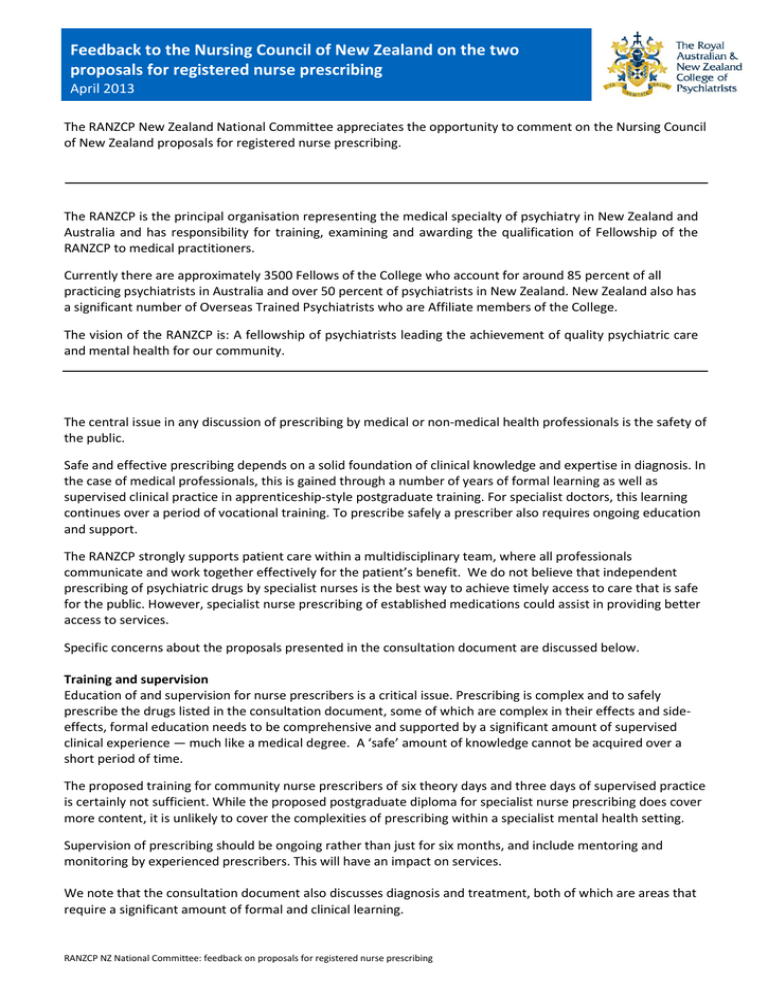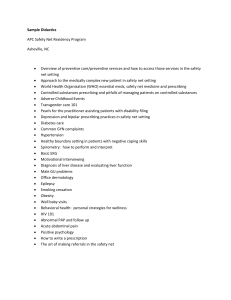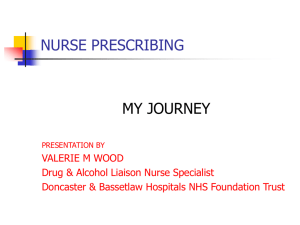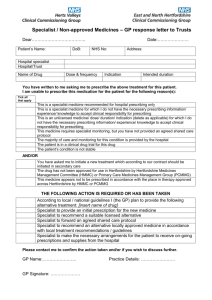The RANZCP New Zealand National Committee appreciates the
advertisement

Feedback to the Nursing Council of New Zealand on the two proposals for registered nurse prescribing April 2013 The RANZCP New Zealand National Committee appreciates the opportunity to comment on the Nursing Council of New Zealand proposals for registered nurse prescribing. The RANZCP is the principal organisation representing the medical specialty of psychiatry in New Zealand and Australia and has responsibility for training, examining and awarding the qualification of Fellowship of the RANZCP to medical practitioners. Currently there are approximately 3500 Fellows of the College who account for around 85 percent of all practicing psychiatrists in Australia and over 50 percent of psychiatrists in New Zealand. New Zealand also has a significant number of Overseas Trained Psychiatrists who are Affiliate members of the College. The vision of the RANZCP is: A fellowship of psychiatrists leading the achievement of quality psychiatric care and mental health for our community. The central issue in any discussion of prescribing by medical or non-medical health professionals is the safety of the public. Safe and effective prescribing depends on a solid foundation of clinical knowledge and expertise in diagnosis. In the case of medical professionals, this is gained through a number of years of formal learning as well as supervised clinical practice in apprenticeship-style postgraduate training. For specialist doctors, this learning continues over a period of vocational training. To prescribe safely a prescriber also requires ongoing education and support. The RANZCP strongly supports patient care within a multidisciplinary team, where all professionals communicate and work together effectively for the patient’s benefit. We do not believe that independent prescribing of psychiatric drugs by specialist nurses is the best way to achieve timely access to care that is safe for the public. However, specialist nurse prescribing of established medications could assist in providing better access to services. Specific concerns about the proposals presented in the consultation document are discussed below. Training and supervision Education of and supervision for nurse prescribers is a critical issue. Prescribing is complex and to safely prescribe the drugs listed in the consultation document, some of which are complex in their effects and sideeffects, formal education needs to be comprehensive and supported by a significant amount of supervised clinical experience — much like a medical degree. A ‘safe’ amount of knowledge cannot be acquired over a short period of time. The proposed training for community nurse prescribers of six theory days and three days of supervised practice is certainly not sufficient. While the proposed postgraduate diploma for specialist nurse prescribing does cover more content, it is unlikely to cover the complexities of prescribing within a specialist mental health setting. Supervision of prescribing should be ongoing rather than just for six months, and include mentoring and monitoring by experienced prescribers. This will have an impact on services. We note that the consultation document also discusses diagnosis and treatment, both of which are areas that require a significant amount of formal and clinical learning. RANZCP NZ National Committee: feedback on proposals for registered nurse prescribing Developing and implementing programmes of community and specialist nurse prescribing has cost implications. We note that New Zealand has an ongoing need for skilled therapists that also requires some investment. There is a solid evidence base for the efficacy of talking therapies, and we would encourage and support the redevelopment of initiatives such as nurse-lead Cognitive therapy and Interpersonal therapy that will improve access to safe and appropriate mental health care for New Zealanders. Teamwork and support It is essential for any non-medical prescriber to be well supported within a team environment. Nurses who are taking on the responsibilities and risks of prescribing will require ongoing support from the team in which they work, from their professional and regulatory organisations and from the service management. However, it is important to remember that a highly functioning team is dependent on the culture within a service — what may work well in some contexts does not always work in others. Obtaining buy-in from services would need to be an essential part of implementation of any nurse prescribing. The RANZCP also notes that any prescribing by specialist nurses in a secondary mental health context needs to be within a team that includes a consultant psychiatrist. The relationship must also be clear so that the nurse is not working independently of the doctor’s opinion. Mental health patients (secondary) A secondary or specialist level mental health patients have a complex presentation. Diagnosis of mental health conditions/disorders and physical symptoms should remain the responsibility of the specialist doctor. A relatively short period of additional training would not necessarily provide nurses with sufficient knowledge to be aware of what could be missed. Psychiatry may benefit from highly trained and experienced specialist nurses who could prescribe and monitor some of the long term medications. However, a specialist nurse should not be initiating new prescriptions. A particularly useful contribution of a specialist nurse prescriber would be repeat prescriptions of wellestablished medications. This could include drugs such as clozapine and methylphenidate that require monthly repeat prescriptions. Drugs such as clozapine would fit well into specialist nurse prescribing of established medications, as nurses have particular expertise around following protocols and generally carry out all required checks and monitoring to a high standard. The concept of independent nurse prescribing is not one that is supported by the RANZCP. Nurse prescribing in psychiatry gives rise to a number of specific concerns, such as: Prescribing should be within the guidelines and best evidence available. This is continually changing and psychiatrists spend a significant amount of time keeping up with the research about efficacious treatments, from a basis of many years’ formal education and apprenticeship-style learning. A Postgraduate Diploma in this area is not sufficient to establish independent prescribing. Most secondary or specialist care in New Zealand works on the assumption that the person has been seen in a primary care setting, where the general practitioner has followed the appropriate guidelines for treatment, but that treatment has not been successful. At this point, most general practitioners ask for a skilled second opinion and question if case management and a multidisciplinary team will help that person. In many cases this is not about medication but support, particularly nursing support. People accessing psychiatric services have complex needs. They can have varying levels of understanding about their situation, from a full and detailed knowledge of treatments available and not yet available in New Zealand to no understanding at all. There is also significant variation in the ability to give consent. In addition, most if not all of the psychiatric medications have medical complications that need skilled assessment and monitoring. The common psychiatric disorders, such as anxiety disorders, generally do not get referred to secondary care (and if they do, they are complex and can be difficult for consultant psychiatrists). The less common conditions, such as the psychoses, remain a challenge to consultant psychiatrists. In many situations an experienced nurse specialist could act as a quasi RMO or MOSS under supervision, but not practice independently. We note that supervision would require a time commitment from the consultant. RANZCP NZ National Committee: feedback on proposals for registered nurse prescribing Psychiatric medications/list of drugs Please note that the comments regarding specialist nurse prescribing presented here refer to psychiatric and controlled drugs only. Prescription of other medications may be regarded differently, and we would rely on the opinion of relevant specialist colleagues. The RANZCP is concerned about the list of drugs and controlled drugs that it is proposed a specialist nurse could prescribe. The lists themselves seem arbitrary and in some ways incomplete, and it is also unclear how they have been developed. In terms of controlled drugs, there are also issues beyond prescribing that have not been considered in the consultation document. Resisting patient demands is a typical example. RANZCP members suggest that psychiatric drugs should be removed from the proposed list a nurse specialist can independently prescribe from. The RANZCP would be happy to provide input on a revision of these lists. Adverse events It is reassuring that the consultation document mentions adverse events and how these should be prevented and monitored. However, the document does not address in sufficient detail the complexities and risks of prescribing that need to be managed, but rather seems to emphasize nurse prescribing as safe and effective. Conclusion Delegated prescribing within a multidisciplinary team may be appropriate for suitably qualified and experienced community nurses. While designated prescribing may be appropriate in some circumstances for specialist nurses who are working within a specialist setting, prescribing within psychiatry has additional complexities and requires further discussion prior to any implementation to ensure patient safety. The RANZCP does support appropriately trained and experienced specialist nurses managing repeat prescriptions and prescribing established medications, within a psychiatrist-lead multidisciplinary team. It is essential that any new independent prescriber has robust training and an appropriate level of experience, as well as access to ongoing support and supervision. In this case a specific scope of practice may be more informative to the public. Dr Rosie Edwards, Chair RANZCP New Zealand National Committee RANZCP NZ National Committee: feedback on proposals for registered nurse prescribing



